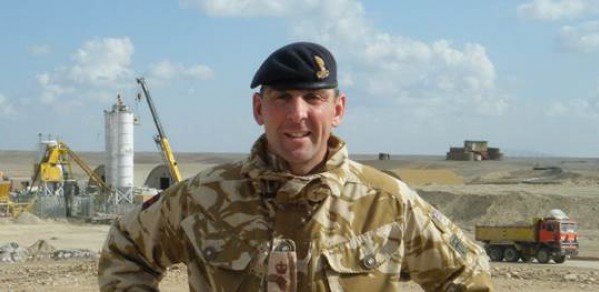
Colonel Stuart Browse (Late Royal Engineers) has spent much of his engineering career in The British Army designing and building infrastructure to support deployed operations overseas.
I have been incredibly fortunate to have a military engineering career spanning some 34 years, and whilst commanding soldiers on operations will always be for me the most humbling and rewarding experience, being able to do that in the engineering context has been truly fulfilling.
Colonel Stuart Browse
Colonel Browse (Jesus College 1988) read engineering after joining the army and after training at the Royal Military Academy, Sandhurst.
As a young Major, Colonel Browse commanded the 62 Cyprus Support Squadron Royal Engineers, an independent support squadron in Dhekelia, Cyprus, from 2003-2005. This was his second tour of duty with the squadron, having served there as a young troop commander immediately after university. In these deployments he put his newly found engineering skills to the test building a shooting range complex, a small harbour and re-erecting some Doric pillars that had fallen after a 4th century earthquake.
Colonel Browse said: "The Doric pillars were in a Basilica in Pathos Cyprus, owned and run as a visitor attraction by the Department of Antiquities within the Government of the Republic of Cyprus. The UK Military conducted the task under the banner of ‘Military Aid to the Civil Community’, it was also great training for my soldiers. The pillars had never been re-erected because of the difficulty of getting lifting apparatus across the ‘priceless’ mosaics between the nearest access road and the pillars. I commandeered part of a school playground and built a 5-bay Extra Wide Bailey Bridge (a modular steel truss through bridge dating from WW2) over the mosaics, and drove a 15 tonne Military crane onto the site to then erect the pillars. The pillars were lifted using a bespoke friction plate steel harness; 4th century pillars are surprisingly slippery!"
His Professional Engineer Training was completed in 1999 and included 18 months in Los Angeles, California. He held a number of significant positions of responsibility for the flood protection works in Los Angeles County and the development of the Port of Los Angeles, including hydrographical dredging work. His surfing skills improved enormously in this time.
As a Chartered Civil Engineer he has completed numerous operational tours delivering operational Infrastructure overseas in Bosnia, Kosovo, Iraq and Afghanistan and the broader Middle East, and also airfield assessment work in India.
He said: “I have been incredibly fortunate to have a military engineering career spanning some 34 years, and whilst commanding soldiers on operations will always be for me the most humbling and rewarding experience, being able to do that in the engineering context has been truly fulfilling. Whether it is building indigenous engineering capacity in far flung corners of the developing world, testing the boundaries of physics lifting 4th century pillars, or working at the more strategic level directing infrastructure delivery, policy and programmes, there has never been a dull moment. Even now, I'm still sometimes surprised by the displays of engineering invention, innovation and creativity that some of the soldiers, sailors and airmen I have worked alongside display, when faced with engineering problems in unfamiliar environments.”
He has recently set up and led an Infrastructure Optimisation Programme which will look at the optimisation of the existing estate across all estate users and in all environments for the Ministry of Defence. It aims to reduce the size of the MOD’s built estate by 30% by 2040.
As a Lieutenant Colonel he commanded the 63 Works Group Royal Engineers (Electrical power generation and distribution), a group of multi-disciplinary design engineers, which included two Operation Herrick tours in Afghanistan delivering airfield infrastructure and stabilisation effect and economic growth in Southern Helmand through construction. In these jobs he had both policy responsibilities and a technical remit as the Group’s principal Chartered Engineer.
He has worked at The Permanent Joint Headquarters (the headquarters created to command joint and combined military operations), with responsibility for all operational infrastructure and infrastructure policy and strategy overseas. Latterly, he has also worked at the heart of the Ministry of Defence in Whitehall in Finance and Military Capability, attempting to balance the difficult issue of delivering military capability within increasing financial constraints.
Prior to his time at Jesus College, where he was a 1st XV rugby regular, a member of the University Officers' Training Corps and an occasional rower, Colonel Browse was educated at Welbeck College. He is married to Juliet who runs the family business; they have two young children, and a fleet of aging classic cars littering the driveway. He reviews Chartered Engineer and Incorporated Engineer candidates for professional engineering institutions and mentors some aspiring candidates. He enjoys the three classic ‘officer sports’ of hunting, shooting and fishing, in addition to squash and rugby (now restricted largely to watching his son from the sideline).
Colonel Browse is currently responsible for the 50,00 defence portfolio of Service Family’s Accommodation and is based at RAF Wyton in Huntingdon.

